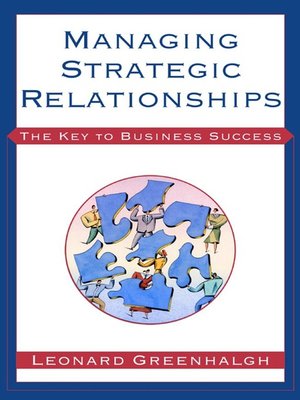
Sign up to save your library
With an OverDrive account, you can save your favorite libraries for at-a-glance information about availability. Find out more about OverDrive accounts.
Find this title in Libby, the library reading app by OverDrive.



Search for a digital library with this title
Title found at these libraries:
| Library Name | Distance |
|---|---|
| Loading... |
Contrary to the gospel of a century of management thinkers, the primary job of the manager is no longer to plan, organize, direct, or control, asserts management expert Leonard Greenhalgh. Instead, he argues, today's successful managers are primarily negotiators who are judged on their ability to foster, coach, protect, and support collaborative relationships — and manage conflict — with peers, workers, bosses, suppliers, customers, regulators, competitors, and stakeholders.
In one of the most comprehensive analyses of business relationships ever written, Greenhalgh shows how relationships — not technology or "know-how" — are the foundation of the new extended enterprise. In immensely readable prose, he describes how companies have moved beyond adversarial relationships of command-and-control hierarchies to a new communal world in which internal networks of autonomous professionals and external networks of collaborating organizations compete against rival networks. In order to manage, managers must acquire a whole new set of negotiating skills, he argues. Traditional negotiating techniques promoted winning and self-interest, leaving a wake of bitterness and acrimony. Here Greenhalgh introduces for the first time a brilliant concept he calls "Commonwealth," which promotes ongoing relationships and the common interest. Using scores of detailed case studies and examples, he offers a set of cutting-edge tools managers can apply immediately to repair and improve relationships between people at all levels of responsibility, between groups, between organizations themselves, and between personalities involving gender differences.
Timely, stimulating, and powerful, Managing Strategic Relationships is essential reading for every manager who hopes to succeed in the organization of today.
In one of the most comprehensive analyses of business relationships ever written, Greenhalgh shows how relationships — not technology or "know-how" — are the foundation of the new extended enterprise. In immensely readable prose, he describes how companies have moved beyond adversarial relationships of command-and-control hierarchies to a new communal world in which internal networks of autonomous professionals and external networks of collaborating organizations compete against rival networks. In order to manage, managers must acquire a whole new set of negotiating skills, he argues. Traditional negotiating techniques promoted winning and self-interest, leaving a wake of bitterness and acrimony. Here Greenhalgh introduces for the first time a brilliant concept he calls "Commonwealth," which promotes ongoing relationships and the common interest. Using scores of detailed case studies and examples, he offers a set of cutting-edge tools managers can apply immediately to repair and improve relationships between people at all levels of responsibility, between groups, between organizations themselves, and between personalities involving gender differences.
Timely, stimulating, and powerful, Managing Strategic Relationships is essential reading for every manager who hopes to succeed in the organization of today.







